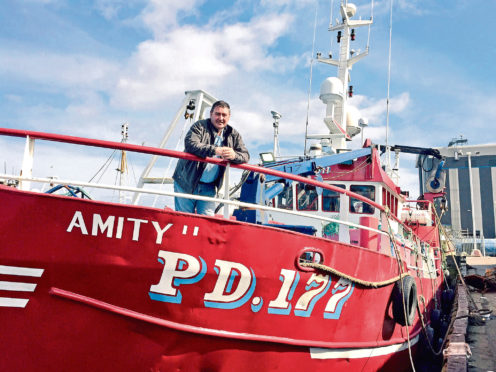Scotland’s best-known fisherman has sold his boat, it has emerged.
Jimmy Buchan, who shot to fame as one of the stars of BBC’s Trawlermen series from 2006-10, is no longer the proud owner of the Peterhead-registered Amity II.
He has sold it to James Cowie, of Gardenstown, whose last vessel sank off the Fraserburgh coast in August.
Mr Cowie’s son, also called James, was one of five crew who were airlifted to safety after the Ocean Quest took on water and got into difficulties 70 miles from land.
The Marine Accident Investigation Branch sent inspectors to investigate the incident.
Amity II’s new owner is now looking forward to his crew being able to fish again after acquiring the 70ft prawn trawler.
There are a few formalities to complete first, Mr Cowie said, adding: “It’ll probably be three or four weeks before all the paperwork gets done.”
The 65-year-old refused to say how much he paid for his new boat, but one industry source suggested it may have changed hands for £500,000-£600,000.
According to the same source, Mr Buchan, 59, has also sold valuable fish quota for about £500,000. Another leading industry figure said the vessel sale was “good news” as Mr Buchan had been looking to sell it for a while.
Mr Buchan, who is also chief executive of processing industry body the Scottish Seafood Association, could not be contacted.
He still owns the Amity Fish Company, which supplies langoustines, haddock, cod, lemon sole, sea bass, smoked salmon, trout and other seafood to retail and food service customers, and his Skipper’s Choice mail-order business.
It is just over seven years since he completed a £750,000 overhaul of the Amity II, helped by £238,000 in grants from Scottish Government and EU funds, plus lending from Bank of Scotland, in a show of faith in the industry’s future.
While it was his life at sea catching fish that earned Mr Buchan his celebrity status, in the past few years he has devoted more of his time to helping a hard-pressed processing sector overcome major challenges and prepare for Brexit.
He has played a leading role in highlighting the plight of north-east processors who have faced soaring business rates, not to mention the frustrating sight of fish other seafood landed at north-east ports being trucked south for processing in factories in England or abroad.
